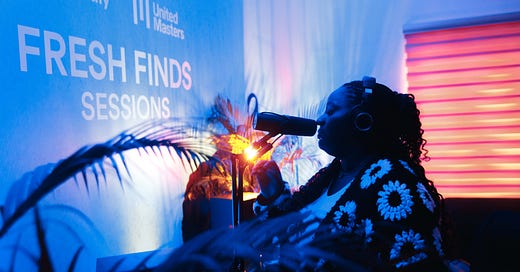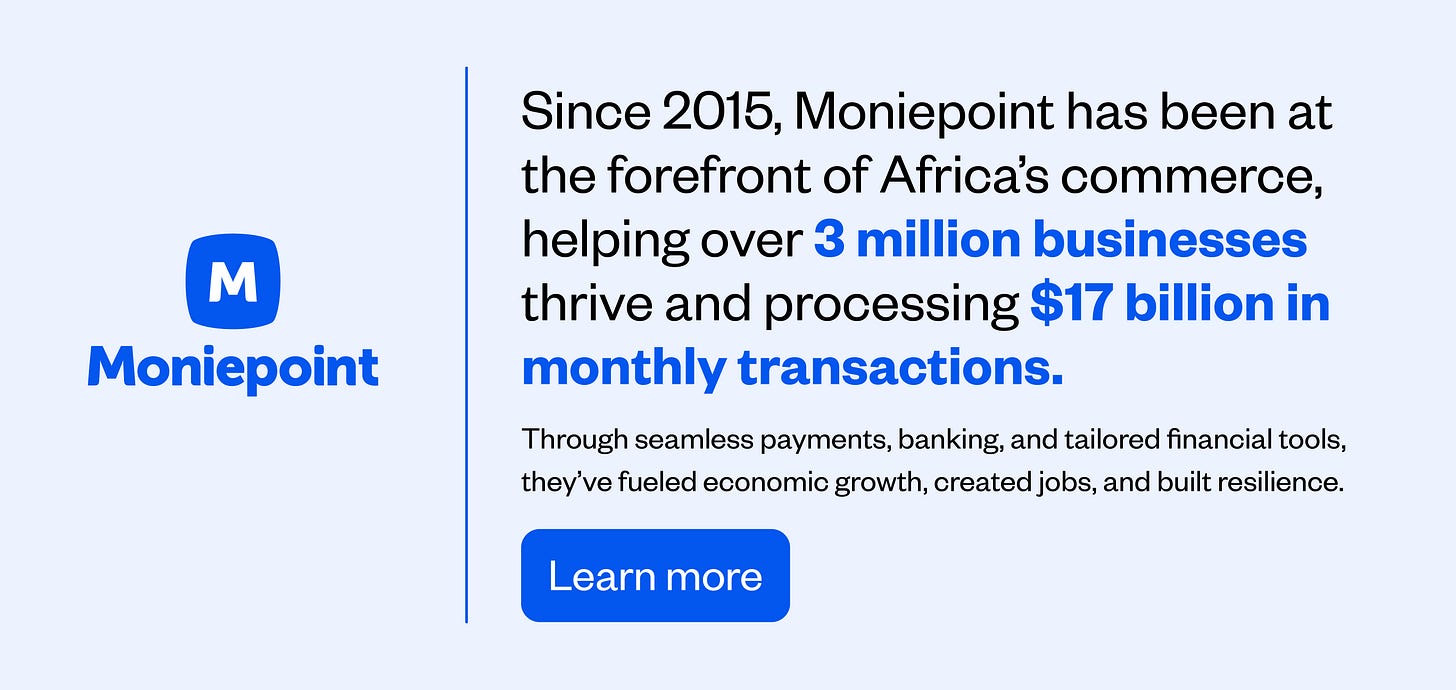Communiqué 56: Inside Spotify’s Africa machine
Afrobeats and Amapiano have benefitted from Spotify’s investments. But who are the people behind this success?
Presented by
1. A fresh pair of eyes
Late one Saturday evening in January, Miche Atagana, Spotify’s Sub-Saharan Africa communications and PR lead, stood before a group of young Nigerian musicians and producers, taking them through slide after slide of a media training masterclass.
Atagana showed the artists how to prepare for media appearances, conduct themselves in public, and craft their images responsibly—subjects that artists rarely consider until several years into their careers. Some never even learn them, and, in the process, churn out uninspiring interviews and vapid media appearances.
The media training session was one more in a long day of a boot camp, and that Saturday was the third and final day. Over the two previous days, a different set of artists went through something similar. Their day started with introductions and a briefing from Victor Okpala, Spotify’s artist and label partnerships manager for West Africa. Then the artists—gathered in a studio building in the upscale neighborhood of Lekki, Lagos—spent the rest of their time listening to and asking advice from established industry players, recording new music, and interacting with each other.
This particular boot camp—inspired by Fresh Finds, Spotify’s playlist dedicated to emerging artists, and in partnership with United Masters, a music distributor—was the first of its kind. The company’s Africa team got the go-ahead to spin the playlist into something more personal and tangible. It took months of planning and carefully selecting participants. But eventually, Spotify’s first-ever Fresh Finds Sessions came to life in Lagos, Nigeria.
Roaming around the building and observing things in motion, I felt like I was experiencing the early days of a Burna Boy, Wizkid, or Davido—Afrobeats’ holy trinity. Not many artists present had up to 100,000 monthly listeners, but Spotify was determined to be a factor in their early and future success, much like it has done for Afrobeats globally.
This was Spotify’s attempt to level the playing field of an industry that’s become harder to break into without bags of money. Okpala told Communiqué, “An emerging musician's journey is not the easiest as there is constant pressure to break into mainstream music and stay relevant. If it’s done in the wrong way, it can set the artist back. By supporting the industry with educational tools, collaborative platforms, and engaging masterclasses, we help them overcome a myriad of challenges.”
Ultimately, the Fresh Finds Sessions were Spotify’s way of doubling down on a continent that has shown so much promise and growth—another initiative in its attempt to deepen its influence across Africa.
2. The algo-rhythm
Very often, conversations around Spotify’s impact in Africa revolve around its role in popularizing Afrobeats, and that is understandable. After all, the genre’s streaming figures on the platform have grown more than 500% in the last few years. But what’s even more impressive is its overall impact on general streaming. For instance, between 2022 and 2024, Christian podcast streams grew 482%, while Gospel music grew by over 1,220% in Nigeria. Within the same period, Highlife and Igbo Pop, two genres you can consider truly indigenous, grew by 224% and 303% respectively.
Some of this is the result of external factors, like the booming interest of a fast-growing youth population, increased internet penetration and smartphone literacy, and a general willingness to explore old sounds in new ways. But what’s also significant is the work behind the scenes by a team of people paying attention to these trends, listening to the audience, and collaborating with industry players in multiple markets. It is the product of Spotify’s investment in a truly pan-African team within Africa, avoiding the usual trap of importing talent to force a strategy on a region that, in some ways, is different from many others.
Most of Spotify’s African executives are natives who live and work on the continent. For instance, Jocelyne Muhutu-Remy, its SSA managing director, was born in Ethiopia to a Burundian father and Rwandan mother and lives in South Africa. Phiona Okumu, its SSA head of music, is a Ugandan born in Kenya. Several of its music operations executives are Nigerians and South Africans who have lived most of their lives on the continent, fully aware of its cultural and sonic intricacies. They know what it means to be and sound African.
All of the people who make major decisions and influence the company’s Africa strategy are citizens of African nations and reside on the continent. They are exposed to their listeners’ sensibilities, they understand the industry stakeholders’ pain points, and they grasp the market dynamics—what makes things work and what makes them, well, complicated.
A big part of their work over the last few years has been advocacy, and it helps that the company has a structure that encourages people from different regions to make their voices heard. This is evident in the long list of initiatives Spotify’s Africa team has championed, from pushing for African features on global playlists and investing heavily in popularizing the African Heat playlists to spending significantly to promote African artists on Times Square billboards in New York, countless partnerships with industry event organizers, and encouraging collaboration with curators and colleagues across Europe, the U.S., and Latin America.
Often, Spotify playlist curators (or editors, whose identities are usually protected to stop industry lobbyists from attempting to influence decisions) share songs across regions with the goal of cross-platforming them. This, for instance, is what opens the door for a hit track in Lagos to become popular in Amsterdam or Berlin. It is what makes it possible for a quietly famous song in Johannesburg to explode in London or Paris. It is one of many reasons why Afrobeats and Amapiano have become global phenomena.
These things are not accidental.
3. La coda
One of the biggest Afrobeats stories in the last two years has been the global success of Rema’s Calm Down, the continent’s first-ever billion-stream song on Spotify.
The signs were there early on that the song was going to be a hit. “Before its explosion on the global stage, Calm Down was doing well on several of our playlists,” Okpala told Communiqué. “Its natural appeal led to millions of listeners discovering and falling in love with it.”
As the song gained popularity, the artist’s team, using access to backend data, began exploring potential collaborations to expand its reach. The decision, and what really tipped things over the edge, was a feature with Selena Gomes. Soon after, Calm Down became a global phenomenon and started appearing in places the team could have never imagined—India, Brazil, Spain, and so on.
Bomi Anifowose, writing for The Upper Entertainment, describes this perfectly:
“Rema’s Calm Down benefited immensely from Spotify’s push. After the remix featuring Selena Gomez dropped, Spotify included the song in its top-tier playlists like Today’s Top Hits, which has millions of followers. The result? Rema’s track went viral on a scale previously unimaginable for a young artist from Nigeria. Spotify’s ability to connect emerging artists with global audiences turned Rema into an international star. Rema didn’t just make it to the top; Spotify helped put him there with campaigns that pushed his sound from ‘underground’ to ‘international radio staple.’”
No other song led by an African artist has reached the threshold that Calm Down crossed, but a few albums have, including Burna Boy’s Love, Damini, Rema’s Raves & Roses (Ultra), and Tyla’s Tyla. All of these projects hold water on their own. But they have also greatly benefited from the hard work of a group of people maintaining and improving the engine of a vehicle that otherwise could have left their continent behind.
As I think deeper about the events and conversations surrounding the Fresh Finds Sessions, I realize just how much work goes into making cultural goods globally accessible. I also wonder how much of this is replicable across industries other than music—film, television, arts, fashion, and sports. The opportunities seem boundless; the effort and strategic thinking, not so much. Or maybe, like it was for Afrobeats, the timing has to be right.
Whatever the case may be, one thing is certain: it will always be in the hands of people—people who live and breathe the essence of those cultural goods. They are the ones who make these things work. No one else.







Thank you, Communique Publications, for doing the Lord's work!
Your articles are as insightful as they are informative